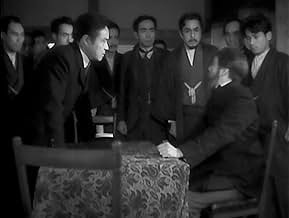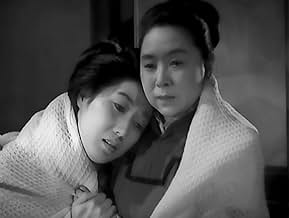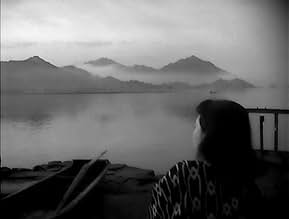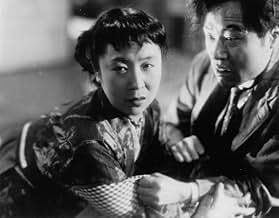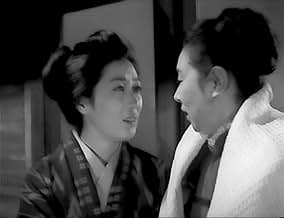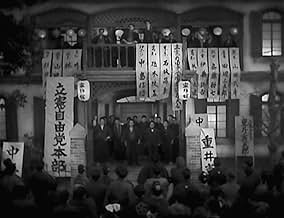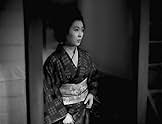Añade un argumento en tu idiomaA woman's struggle for equality in Japan in the 1880s. Eiko Hirayama leaves Okayama for Tokyo, where she helps the fledgling Liberal Party and falls in love with its leader Kentaro Omoi, jus... Leer todoA woman's struggle for equality in Japan in the 1880s. Eiko Hirayama leaves Okayama for Tokyo, where she helps the fledgling Liberal Party and falls in love with its leader Kentaro Omoi, just as the party is being disbanded by the government. Eiko and Omoi are jailed because of a... Leer todoA woman's struggle for equality in Japan in the 1880s. Eiko Hirayama leaves Okayama for Tokyo, where she helps the fledgling Liberal Party and falls in love with its leader Kentaro Omoi, just as the party is being disbanded by the government. Eiko and Omoi are jailed because of a fire at a factory instigated by Chiyo, a servant girl from Eiko's home in Okayama, who wa... Leer todo
- Dirección
- Guión
- Reparto principal
Reseñas destacadas
Again, the leading role is played by Kinuyo Tanaka and based on a real person: she quarrels with her conservative parents over her support of the Liberals; however, she can’t bring herself to follow her partner to Tokyo…until a friend of the family is sold into slavery to pay off her father’s debts! However, when she arrives in the big city and searches for her former companion, he seems changed and clearly considers her presence there intrusive; it transpires that he’s sold out to the Government and is spying on the Liberals (the Election being just around the corner)! Having struck a relationship with the leader of the party, she stays on; arriving at an appointed meeting-place one day, she sees her old girlfriend being beaten up (this must surely have been quite a shockingly violent scene for its time!) and tries to intervene – the latter, in contempt and desperation, burns down the place; the Police then turn up and arrest several people – including the heroine, her new partner and the young girl.
The two women share the same cell: the young girl, however, has grown bitter with the passage of time and is abrasive even to her caring older friend; still, together they endure hardship in the prison quarry – until it’s discovered that the young girl is pregnant (from the man who had bought her); she loses the baby…but, then, a General Amnesty of political prisoners is called and the three protagonists are re-united. With this, though, Tanaka’s problems merely take a different turn: her partner is exposed as a libertine who shamelessly keeps the young girl as a concubine (a situation revealed to her by the latter’s former master/lover)! Nevertheless, he’s elected to Parliament; disillusioned yet undaunted in her hope of one day getting to see Japanese women attain Equality, Tanaka ultimately decides to return to her hometown (a sequence tinged with irony as the heroine overhears some people praising the humanitarian qualities of the Liberal candidate!)…but, on the train, she’s joined by the young girl (who, realizing she was being exploited even by those who should know better, is looking forward to a more dignified existence).
While on paper all of this might seem less than appetizing (being a mix of politics and melodrama), Mizoguchi’s assured handling makes all the difference – resulting in a compelling portrait of an era, highlighted by impressively-staged crowd scenes and any number of powerful individual moments depicting tension, cruelty, heartache and faith.
Although Miss Tanaka endures hardships, it is Mitsuko Mito who suffers degradation. It is she who is sold by her parents to provide for her old age. It is she who is raped and beaten. It is she who seeks to be the servant of a man, any man, who promises to take care of her.
It's a feminist movie directed by Kenji Mizoguchi, as raw a political tract as any he directed. He would show degradation of the individual with Miss Tanaka in works life LIFE OF OHARU. In that one, it is an individual degradation that stands in for every woman. In this one, he shows how the political system of Japan works to degrade women, and how they must struggle to make a new Japan. the artful beauty of his films does not exist here. Instead, there is the pandemonium of the factories and women's prisons, where the men in charge beat and rape their charges, and the smug satisfaction of the newly enfranchised men, who feel that now that they have power, everything is fine... and nothing changes.
¿Sabías que...?
- ConexionesReferenced in Kenji Mizoguchi, la vida de un cineasta (1975)
Selecciones populares
Detalles
- Duración
- 1h 36min(96 min)
- Color
- Mezcla de sonido
- Relación de aspecto
- 1.37 : 1

